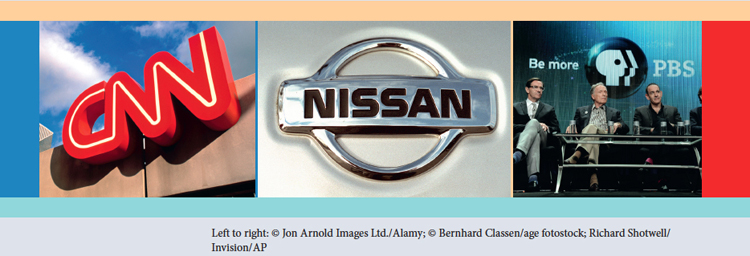Arguments Based on Character: Ethos
3
Arguments Based on Character: Ethos
40

Whenever you read anything — whether it’s a news article, an advertisement, a speech, or a text message — you no doubt subconsciously analyze the message for a sense of the character and credibility of the sender: Is this someone I know and trust? Does the PBS reporter seem biased? Why should I believe an IRS official? Is this scholar really an authority on the subject? Our culture teaches us to be skeptical of most messages, especially those that bombard us with slogans, and such reasonable doubt is a crucial skill in reading and evaluating arguments.
For that reason, people and institutions that hope to influence us do everything they can to establish their character and credibility, what ancient rhetors referred to as ethos. And sometimes slogans such as “All the News That’s Fit to Print,” “Fair & Balanced,” or “Lean Forward” can be effective. At the very least, if a phrase is repeated often enough, it begins to sound plausible. Maybe CNN is the most trusted name in news!
41
But establishing character usually takes more than repetition, as marketers of all kinds know. It arises from credentials actually earned in some way. In the auto industry, for instance, companies such as Toyota, General Motors, and Nissan are hustling to present themselves as environmentally responsible producers of fuel-efficient, low-emission cars — the Prius, Volt, and Leaf. BMW, maker of “the ultimate driving machine,” points to its fuel-sipping i3 and i8 cars as evidence of its commitment to “sustainable mobility.” And Elon Musk (who builds rockets as well as Tesla cars) polishes his good-citizenship bona fides by sharing his electric vehicle patents with other manufacturers. All of these companies realize that their future success is linked to an ability to project a convincing ethos for themselves and their products.
If corporations and institutions can establish an ethos, consider how much character matters when we think about people in the public arena. Perhaps no individual managed a more exceptional assertion of personal ethos than Jorge Mario Bergoglio did after he became Pope Francis on March 13, 2013, following the abdication of Benedict XVI — a man many found scholarly, cold, and out of touch with the modern world. James Carroll, writing for the New Yorker, identifies the precise moment when the world realized that it was dealing with a new sort of pope:
“Who am I to judge?” With those five words, spoken in late July [2013] in reply to a reporter’s question about the status of gay priests in the Church, Pope Francis stepped away from the disapproving tone, the explicit moralizing typical of popes and bishops.
— James Carroll, “Who Am I to Judge?”
Carroll goes on to explain that Francis quickly established his ethos with a series of specific actions, decisions, and moments of identification with ordinary people, marking him as someone even nonbelievers might listen to and respect:
As pope, Francis has simplified the Renaissance regalia of the papacy by abandoning fur-trimmed velvet capes, choosing to live in a two-room apartment instead of the Apostolic Palace, and replacing the papal Mercedes with a Ford Focus. Instead of the traditional red slip-ons, Francis wears ordinary black shoes. . . . Yet Francis didn’t criticize the choices of other prelates. “He makes changes without attacking people,” a Jesuit official told me. In his interview with La Civiltà Cattolica, Francis said, “My choices, including those related to the day-to-day aspects of life, like the use of a modest car, are related to a spiritual discernment that responds to a need that arises from looking at things, at people, and from reading the signs of the times.”
42

In that last sentence, Francis acknowledges that ethos is gained, in part, through identification with one’s audience and era. And this man, movingly photographed embracing the sick and disfigured, also posed for selfies!
You can see, then, why Aristotle treats ethos as a powerful argumentative appeal. Ethos creates quick and sometimes almost irresistible connections between readers and arguments. We observe people, groups, or institutions making and defending claims all the time and inevitably ask ourselves, Should we pay attention to them? Can we rely on them? Do we dare to trust them? Consider, though, that the same questions will be asked about you and your work, especially in academic settings.